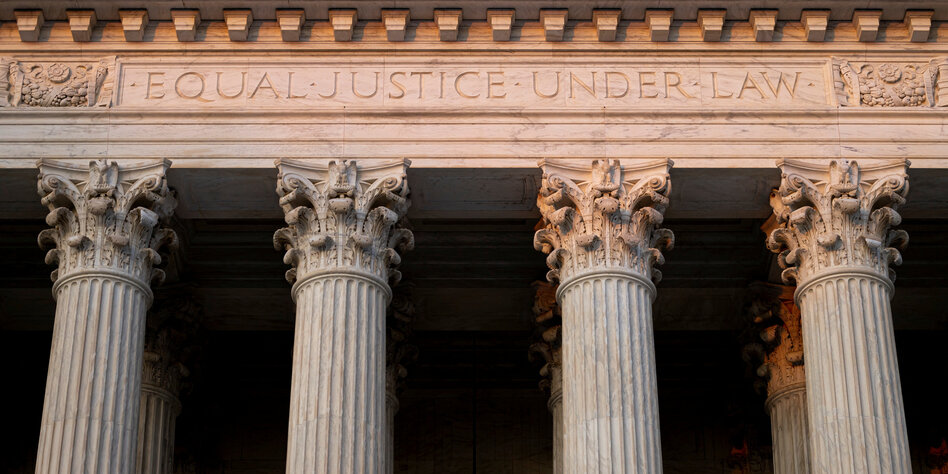The US Supreme Court has given presidents carte blanche to commit crimes as long as it is an official act.

The law – that's me! Convicted criminal Donald Trump recently boasted about his power over the justice system. Photo: Kevin Mohatt/Reuters
The ruling issued by the US Supreme Court on Monday caused a stir. With a conservative majority of 6 to 3 judges, the Supreme Court ruled that former US presidents – and their staff – were immune from prosecution for all official acts during their term in office.
In doing so, wrote liberal Justice Sonia Sotomayor in her unusually sharp minority opinion, “the court is creating a legal vacuum around the president and overturning the status quo that has existed since the country’s founding.”
The court acknowledged that not all of a president's actions should be considered “official” official acts and that immunity does not apply to “non-official” ones. But the justices left it up to lower courts to define this precisely.
Memories of a completely different case are awakened: when Chilean dictator Augusto Pinochet was arrested in Britain in 1998 on the basis of a Spanish arrest warrant, British judges had to decide whether he enjoyed immunity as head of state.
Immune, immune, immune.
In a verdict that was also historic for international criminal law, they decided that torture and murder were never among the legitimate official acts of a president that should be protected from prosecution. The US Supreme Court ruling does not provide such a clear definition.
But if every instruction from a president can always be considered an official act, that’s a very broad field. In the words of Justice Sotomayor: “Do Navy Seals order Team 6 to assassinate a political rival? Immune. Do they organize a military coup to stay in power? Immune. Do they accept a bribe in exchange for a pardon? Immune. Immune, immune, immune.”
The Supreme Court's decision was prompted by the various proceedings against former President Donald Trump for his attempt to fraudulently turn his 2020 election defeat into a victory. After being exposed to a total of three criminal proceedings in this context, he called into question the requirement of absolute immunity at the end of 2023.
It was clear that a decision on the matter would have to come to the Supreme Court sooner rather than later, but instead of quickly taking up the case in December, the justices took until February to do so, and then until late April to convene a hearing for a verdict on the last day before summer break on Monday. This moment alone gave Trump the relief his lawyers desperately wanted in an election year.
Tense trust
Monday’s ruling almost certainly frees Trump from any concern that one of the various trials could begin before Election Day or even enter a decisive phase. Especially since the same Supreme Court had already decided last Friday that those accused and convicted of their participation in the assault on the Capitol on January 6, 2021 could not be charged with “obstruction of a state act.” (obstruction) be prosecuted.
Although the certification of Joe Biden's electoral victory was delayed for many hours, the relevant paragraph also stipulates that evidence or documents must have been destroyed in order for a conviction to occur. The decision affects some 250 already convicted Capitol attackers, and former President Trump, who is accused, among other things, of inciting the mob in the same paragraph.
With these and a whole series of other decisions, including the abolition of abortion rights, the Supreme Court has managed to seriously undermine confidence in its legal fidelity and independence. The worst fears raised by liberals against the three conservative judges appointed by Trump seem to be coming true.
All three — Neil Gorsuch, Brett Kavanaugh and Amy Coney Barrett — were nominated by the right-wing conservative legal organization Federalist Society, whose roster the then-president of the United States also used to fill dozens of positions on lower federal courts.
I, the Supreme Court
Trump himself claims that all the cases against him were initiated by the current President Biden; he complains of politically motivated prosecutions to get rid of a competitor. And the entire Republican Party has joined in rhetorically, the government legal warfare to accuse, that is, the misuse of judicial power for political purposes.
At the same time, however, Trump boasts of having abolished the right to abortion. Everyone wanted it, he said a few weeks ago, “I did it.” Me, the Supreme Court.
It is understandable that Justice Sotomayor resorts to a dramatic choice of words. She ends her minority opinion with the words: “For fear of our democracy.” This is now common among political commentators. It is a big step for the justices.
